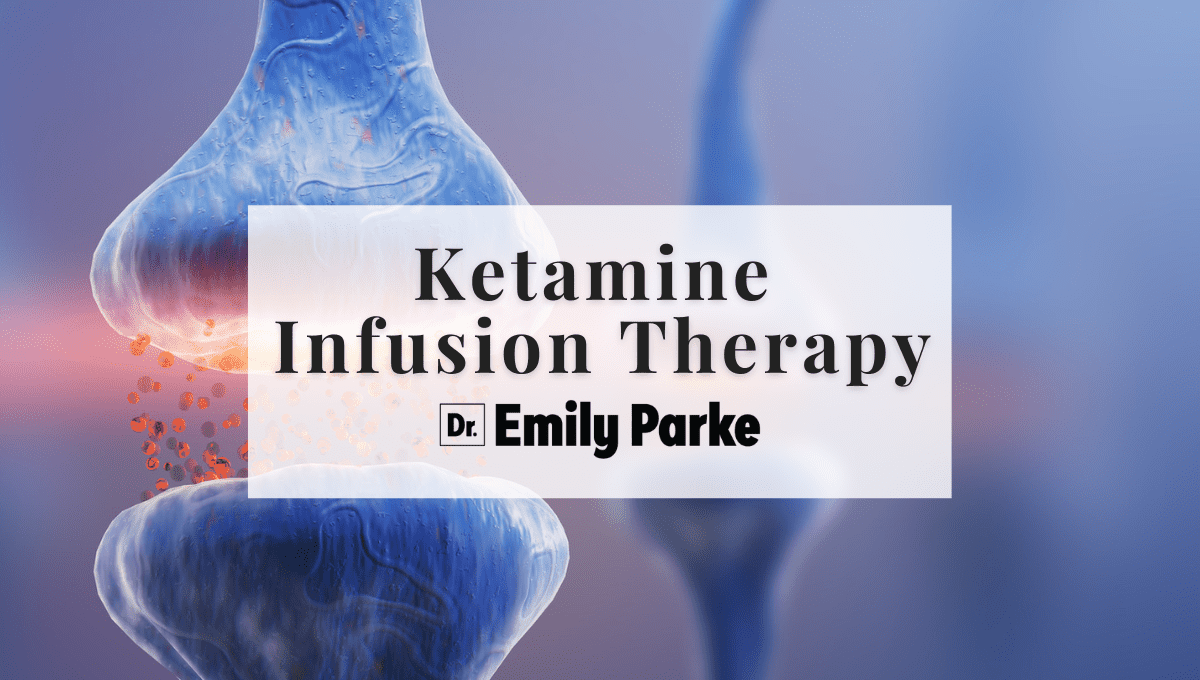Hi, this is Dr. Emily Parke with your next functional health minute. Today, I’d like to talk to you about ketamine and ketamine IV therapy. Let’s start with the basics. What is ketamine? Well, ketamine is an anesthetic that’s been around since the 1960s, so anesthesiologists like myself have been using it our entire careers. However, in more recent years it’s been really well studied at lower doses to be more of a psychedelic type medication. What does that mean? That means that it actually works on neurotransmitter pathways to modulate those specific neurotransmitters, and it does work on several different ones. We used to think it was really mostly the NMDA receptors for ketamine, but there’s evidence to say that it actually works on serotonin or epinephrine, epinephrine, and actually even inflammatory pathways as well. Ketamine really does so much, or has so many different physiological actions that have been well documented in research.
What Ketamine Helps Treat
What things are we using ketamine IV infusion therapy for now with success? There’s really good research on treatment resistant depression, PTSD, chronic pain, and chronic pain of multiple different types. This may include things like complex regional pain syndrome, even looking at neuropathic pain, migraines, and so on and so forth. It’s also being studied in several other psychiatric conditions as well. Those are things that ketamine could be potentially helpful for. How does it work? What is it like to get a series of ketamine infusions? First of all, it’s actually done in about a series of six over two to three weeks’ time. That’s the most well studied protocol. The delivery of it is obviously in the IV. It takes about an hour or so to get a ketamine infusion.
Then after your series of six, it depends on how you do as far as how many more infusions will be needed. That’s a question I get a lot. What happens after the infusion series is done? How often will I need to keep coming? Well, it does vary from patient to patient. Some patients do well with getting a series once a week for about four weeks after that. Then they may not need any more infusions, maybe just until a quarterly basis. I even have a couple of patients that do well getting it just twice a year, let’s say, for maintenance. It’s just going to depend on how you do and we’re going to individualize it for you.
What Happens During A Ketamine Infusion
What else happens during a ketamine infusion? Your vital signs are monitored the entire time. If there’s any sensations or feelings, anything that comes up, I am right there with you the entire time. Your infusion therapy, by the way, is not just ketamine. There are other medications we can put in the infusion and other medications we can push in the IV. There are also other nutrients that we might give. All of that depends on what information comes up in your ketamine infusion therapy consultation. The consultation is done prior to the ketamine infusion. Usually it’s done on a different day than the infusion, but we do have a fast track option. Let’s say you’ve had recent labs and a recent doctor’s visit. You come with all the information that I need. We may be able to proceed with doing ketamine infusion the very same day.
During the ketamine consultation, we’re going to review everything, your medical history, your medication history, your psychiatric history, any allergies that you might have, any adverse reactions to previous medications, everything, including all of your laboratory values that I want to look at. Why do I care so much about labs? Well, a couple of reasons. One, obviously I need to make sure the infusions are safe, so I’m checking things like kidney and liver function. I’m also wanting to check top reasons for things like depression and chronic pain and PTSD and so on and so forth. I’m looking at things like, what is your thyroid function? What are simple nutrient levels? What is your vitamin D and your B12 for example? What are your inflammatory markers? What are they looking like? The ketamine consultation really does a more thorough evaluation to make sure that there are also no other really common things that could be going on that could be contributing to your symptoms.
Then in addition to that, during the consultation, we really decide what your specific cocktail will be, as in what other medications or even additional nutrients. For example, let’s say your labs come back and you’ve got lower B12 levels and so on and so forth. We may add that to your infusions. In addition, when you get a ketamine consultation, we are also going to be talking about lifestyle factors. What can you do to maximize your results when you’re getting a ketamine infusion? We’re going to talk a little bit about what you should be doing for nutrition, sleep, exercise, movement, stress management, and toxin reduction.
Then, of course, because we do functional medicine at Arizona Wellness Medicine, if you really want to take the deeper dive to figure out what your specific root causes of either your treatment resistant depression, PTSD, chronic pain, and so on and so forth, are there other things going on that could be contributing factors to those, then, of course, you can also become a full functional medicine patient at Arizona Wellness Medicine. I hope this explains a little bit about ketamine infusion therapy and how we do it at Arizona Wellness Medicine.










I’ve been suffering from chronic headaches and migraines for a while now, so I was hoping to get ketamine infusions to help with pain management. I’m thankful you informed us that ketamine infusions come with other medications pushed in the IV to provide us with other nutrients depending on the information that comes up during the therapy consultation. I’ll take note of this while I look for a medical facility nearby that offers ketamine infusion treatments.
Please contact us if you have any questions!